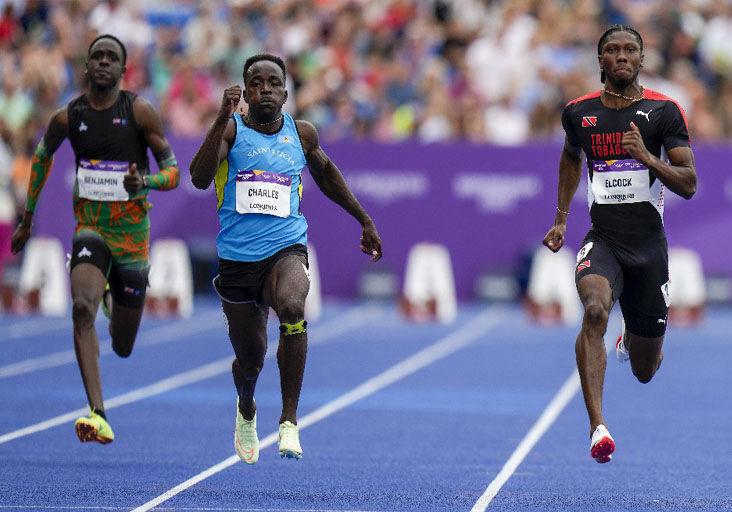
Making sport their business
![]() : Express : Garth Wattley : 09.08.2022
: Express : Garth Wattley : 09.08.2022
Did you see the Commonwealth Games? Did you enjoy it?
Those of you who had access to Jamaica-based cable TV station Sportsmax surely had a good time viewing the action in which Caribbean athletes excelled, not for the first time.
Not only were people in the Caribbean able to see the action "live," they were also able to hear from the region's representatives themselves in a way that was not possible a decade or less ago. The Sportsmax crew deserve big credit for that. And if there is still such a thing as regional integration, then the coverage of the Games certainly helped to familiarise people from Guyana to Jamaica with the athletes beyond their own territories.
It also helped to remind everyone that the problems facing sportsmen and women in this region are basically the same.
As well as the netball "Sunshine Girls" of Jamaica did in reaching their first final by beating New Zealand and eventual winners Australia, they did so against a background of poor funding.
Veteran Barbadian sprint hurdler Shane Brathwaite earned silver in the 110 metres hurdles at age 32. It was a special effort seeing that Brathwaite has no commercial sponsor, not even a shoe sponsorship which goes a long way in assisting athletes to make their way in the sport.
Glamour is fleeting for the average competitor. Outside of the small pool of elite champions, the glitter of a medal fades quickly once meets conclude and ordinary life resumes.
I saw some cynical comments pop up on social media after at least one corporate sponsor put out a congratulatory advertisment for Nicholas Paul. The cynicism is understandable. Such ads or events associating companies with athletes are rare outside of some success at a global event. But such is the way things are done in these islands.
One wonders, however, how many of the five medals ace cyclist Paul would have won over the last five weeks or so at the UCI Nations Cup and the Commonwealth Games had he not been training at the World Cycling Centre (WCC) in Switzerland under a WCC coach, Craig McClean and instead had to train at home where there is no national coach at the moment.
The elite athlete funding plus the cash incentives Government now routinely gives for medal-winners at global and regional games certainly is a bonus for the likes of Paul, Commonwealth double-gold winner Jereem Richards and others.
But Government help is simply not enough; not for those who fall short of getting on the podium or have not yet qualified for elite funding.
For a certainty, private companies have their own challenges in these pandemic/Ukraine War times. But as the weekend showed, when sports teams do well, it is big news. Everyone takes note, including the country's leaders.
Investing in people who have not yet made it therefore, is no more a risky investment than trading on the stock exchange. And it is hard to put a money value on the global exposure gained when medals are won under the cameras at the Olympics, World Championships, or even the Commonwealth Games.
With the support of big business, more of them will climb the podium at some level; and people like winners. Public support for local meets could also increase a bit if more athletes were attaining a higher standard. The heydays of Southern Games may not come back, but there can still be a spectator revival.
Going back to what was on show in Birmingham over the past 11 days, there was some impressive stuff to see from runners, jumpers and throwers from the Caribbean.
Decathlon man Lindon Victor and World javelin champion Anderson Peters of Grenada demonstrated once more that they are quality performers with their gold and silver medal performances.
And Sada Williams from Barbados laid down a marker for herself as one to watch closely after dismissing the field in the women's 400 metres final.
And outside of Paul with his three medals in three days at the Lee Valley VeloPark and Richards with his "Dream" runs in breaking the Commonwealth record in the 200m final and anchoring the 4x400m team to victory, there are others from T&T who made their case for closer attention.
They "only" got silver. But that medal in the 4x100m final earned by Kyle Greaux, Jerod Elcock, Kion Benjamin and Eric Harrison, assisted by Akanni Hislop in the qualifying round cannot go without comment.
None of that quintet reached an individual final in Birmingham, but Greaux aside, they are new kids on the big-games block. That silver medal run should be a big confidence-booster for them. But how does their local governing body - the National Association of Athletics Administrations - help them to build on this?
This is a chance for corporate T&T to step in; to "adopt" these athletes, not to be opportunistic bystanders.
Others have supported in the past to limited degrees. But now is the time for more of corporate T&T to really make sport their business.

